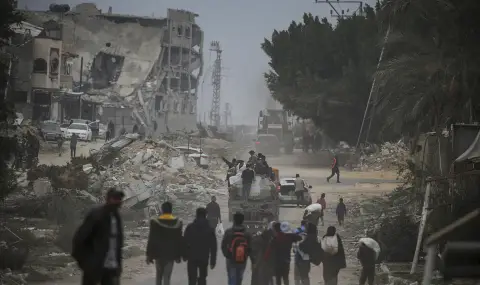The Israeli military issued an evacuation order for most of Rafah on Monday, suggesting a major ground operation is imminent in the southernmost city of the Gaza Strip, the Associated Press reports.
Israel ended a truce with Hamas and resumed air and ground attacks earlier this month. In early March, the country cut off all deliveries of food, fuel, medicine and humanitarian aid to about 2 million Palestinians in an effort to pressure Hamas to accept changes to the peace deal.
The evacuation order covered almost the entire city and surrounding areas. Palestinians were instructed to move to Muwassi - a coastal area already home to overcrowded tent camps. The order came at the height of Eid al-Adha - an important Muslim holiday traditionally associated with family comfort and celebrations.
In May last year, Israel launched a large-scale military operation in Rafah, which led to the destruction of significant parts of the city. The military seized the strategic corridor along the border with Egypt, as well as the Rafah crossing - Gaza's only connection to the world not under Israeli control. According to the initial ceasefire agreement signed in January, Israel was supposed to withdraw from this corridor, but later refused, arguing that it needed to prevent arms smuggling.
Attack on aid workers
Last week, Israeli forces killed 15 emergency workers during a ground operation in the Tel al-Sultan neighborhood of Rafah. According to the International Federation of Red Cross and Red Crescent Societies, it was the deadliest attack on its medics in years.
The Israeli military said it opened fire on several vehicles that appeared suspicious because they were driving without headlights or emergency signals. Among the dead were eight Red Crescent workers, six members of the Gaza Civil Defense and a UN representative. Rescue teams were only allowed to access the area after nearly a week to recover the bodies.
Netanyahu and the plan for the future of Gaza
Israel has said it will continue its military operations until Hamas releases the remaining 59 hostages - 24 of whom are believed to be still alive. Israel is also demanding that Hamas disarm and leave the territory - conditions that were not part of the original ceasefire and that the group strongly rejects.
On Sunday, Israeli Prime Minister Benjamin Netanyahu announced that his country would assume responsibility for security in Gaza after the war. He also expressed support for former US President Donald Trump's proposal for "voluntary emigration" of Palestinians to third countries. The plan was strongly rejected by the Palestinians and criticized by human rights experts as a potential violation of international law.
Hamas is demanding the implementation of the signed agreement, which provides for the release of the remaining hostages in exchange for a permanent ceasefire and the withdrawal of Israeli forces. Negotiations on these issues were due to begin in February, but so far only preliminary talks have taken place.
Devastating consequences of the war
The war began on 7 October 2023, when Hamas militants invaded Israel, attacking military bases and civilian communities. Some 1,200 people were killed and 251 were taken hostage. Most of them were later released under ceasefire agreements.
According to the Gaza Health Ministry, more than 50,000 Palestinians have died as a result of Israeli attacks. About 90% of Gaza's population has been displaced, with many moving multiple times. Vast areas of the territory have been completely destroyed, and the prospects for recovery remain unclear.
